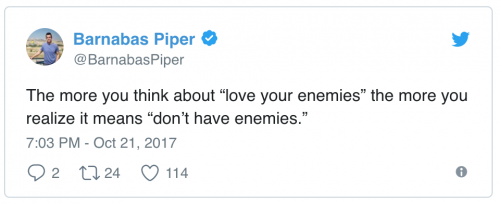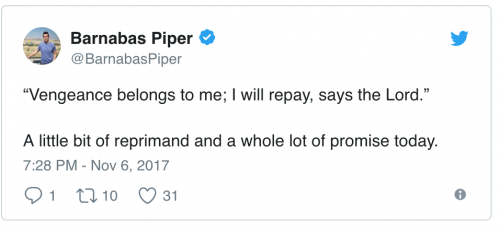Twenty-six of our brothers and sisters in Christ were gunned down a week ago during Sunday morning worship in Sutherland Springs, Texas. The victims ranged from unborn baby to seventy-seven-year-old, including eight people from one family. Devin Kelley, dishonorably discharged from the Air Force, walked into the church and emptied fifteen magazines from his AR-15 in the assembled congregation. The attack came less than a week after an Islamic terrorist drove a truck down a bike path in New York, killing eight. Just over a month ago a shooter killed fifty-eight people and injured over 500 as he rained down bullets on a country music concert from his thirty-second story hotel room. It has been a bloody month in these United States of America. How should Christians think, feel, and pray in the wake of such violence, especially violence perpetrated during a gathered worship service?
First, we must remember that we are not called to the sterile sentimentality of pious choirboys. That is, it is okay to be angry; it is appropriate to long for justice. It is right to pray that God would break the teeth of the wicked and make their feet to stumble. Good little Christians find it difficult to think in terms of wrath. We are sweeter than a bag of Halloween candy. We are nicer than Christmas morning. We show off our piety by refusing to deal with a world in which we have real enemies. For example, take this tweet from Barnabas Piper:

Actually, “Love your enemies,” presupposes that we will have enemies. We must be honest about our world: we do have enemies, and some of them want to kill us. One of them just killed twenty-six saints in Texas. God hates such wicked violence and those that commit it. So should we. God is angry with Devin Kelley, and we should take comfort in His anger. But this is difficult for the pious who trade in the pure thoughts of cotton-candy Christianity, where everybody’s heart should be blessed and soul should be saved. In a world of Love Wins it feels odd to be grateful for God’s hatred. But we must remember that hatred is not so much the opposite of love, but a particular manifestation of it. God hates the wicked because He loves the righteous. In a world that eschews judgment, Christians must glory in the judgments of God. For all His judgments are good, even the ones pronounced in wrath. And when wickedness empties fifteen mags before the offertory we should cry out for God’s judgment.
The Psalms help us give full voice to our imprecations:
“Make them bear their guilt, O God; let them fall by their own counsels; because of the abundance of their transgressions cast them out, for they have rebelled against you.”—Psalm 5:10
“Arise, O Lord, in your anger; lift yourself up against the fury of my enemies; awake for me; you have appointed a judgment.”—Psalm 7:6
“The Lord tests the righteous, but his soul hates the wicked and the one who loves violence.”—Psalm 11:5
“The wicked plots against the righteous and gnashes his teeth at him, but the Lord laughs at the wicked, for he sees that his day is coming.”—Psalm 37:12-13
“How long, O God, is the foe to scoff? Is the enemy to revile your name forever? Why do you hold back your hand, your right hand? Take it from the fold of your garment and destroy them!”—Psalm 74:10-11
Yet, the command to love our enemies still stands. And who are we, but God’s former enemies? The difference between Devin Kelley and me is the sheer grace of God. Part of what it means to love our enemies is to be willing to welcome them as brothers upon repentance and belief, and to share with them the Gospel that leads to such a change. If Kelley were still alive, faithful Christians would both pray for his destruction and his salvation. Our preference is that he would be “destroyed” through repentance—that his old self would be crucified with Christ and that he would be raised to new life. But if the wicked refuse to repent, the godly thing to do is pray that God’s hand would not be stayed, but that he would unsheathe His sword.
In short, Christians are called to image our God, who both hates the wicked and desires that none should perish, but that all should repent and be saved (1 Tim. 2:4, 2 Pet. 3:9).
Of course, in the face of danger, threats, and evil some believers will err in the opposite direction of the confectioners’ sugar Christians, and become bloodthirsty themselves. With much bravado, they will brag about their willingness—eagerness even—to shoot an evildoer, with little thought for actual justice. For them, another Barnabas Piper tweet is helpful, this one after Sutherland Springs:

In the end, we must trust God. We trust Him enough to pray as He taught us in the Psalms, asking for His anger to burn against the wicked and to bring justice and repentance. We trust Him to repay the wicked, refusing to avenge ourselves, as He taught us in Romans 12. We trust that somehow, we can overcome evil with good.
Image Credit: Twitter @MajorNews911

Good balanced perspective on how to reconcile the imprecatory Psalms with the command from Christ to love our enemies.
GOD DOES NOT TAKE PLEASURE IN THE DEATH OF THE WICKED.
The world has rejected Christ but Christ has not turned his back on the world. The word of God tells us that the Lord does not take pleasure in the death of the wicked, but his desire is for all to reach repentance. But there is a day coming in which God will punish the world for its sins.
If you have a little brain left, use the gift of grace to repent and turn away from iniquity. Stop dressing like a prostitute, stop gambling, start rebuking sin and do what the Lord requires of you. Let us fulfill the will of God, for only those who live according to the will of the father will inherit the kingdom of God. Be blessed in Jesus name.
God does not take pleasure in the death of the wicked.